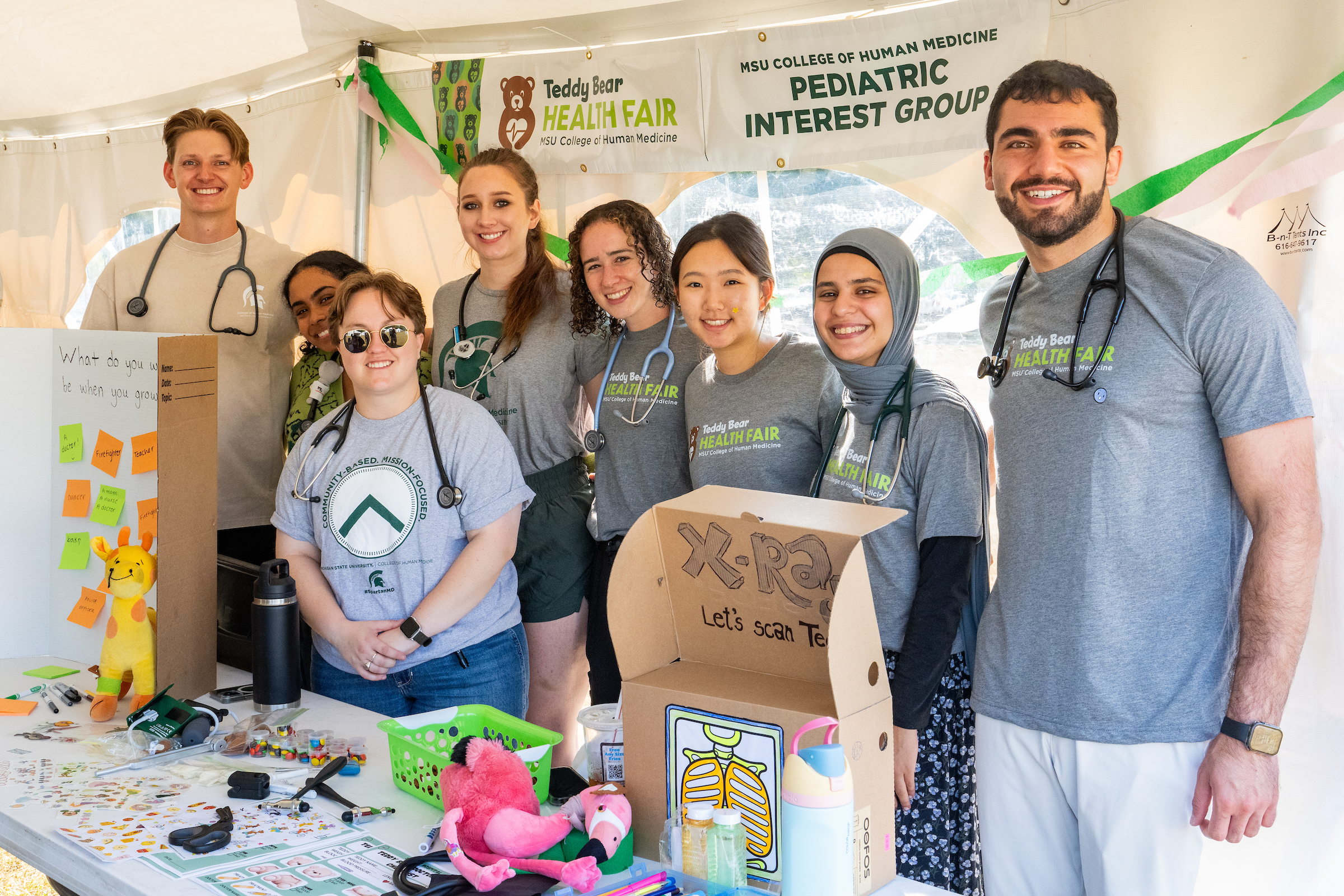Dean's Update
September 27, 2024 - Aron Sousa, MD

Friends,
Just before the Dean’s Update went on vacation, I joined students and faculty at the Grand Rapids Teddy Bear Health Fair. It was great! The kids, their stuffed animals, and their adults visited tents and stations focused on mental health, nutrition, and visiting the doctor. There were multiple x-ray “machines” for stuffed animals, which explains how health costs for teddy bears have spiraled beyond the means of so many families. All of our students at the health fair talked with the kids about pediatric health issues like vaccines, injuries, and doctor visits. It was a lot of fun – my thanks to the community outreach and communication teams for putting the event together, and to our students and faculty for making it such a great event.
This week the three people leading the cancer effort for the Henry Ford-MSU partnership were in East Lansing meeting with colleges, administration, and faculty. I had the chance to attend the reception on Tuesday evening, and it was such a pleasure to see faculty from Henry Ford and MSU campuses talking with each other about their work in cancer. I want to take a moment to appreciate the work of Derek Raghavan, MD, PhD, founding president of the Levine Cancer Institute and former director of the Cleveland Clinic Taussig Cancer Institute, Ben Movsas, MD, chair of the Henry Ford Department of Radiation Oncology (and soon interim chair of our new department), and Jeff MacKeigan, PhD, senior fellow in the MSU Office for Research and Innovation. They are the senior advisors for the organizing effort for the two institutions.
As many of you will know, this is a leading area of focus for the partnership, and the joint institutional funding will go toward hiring wet and dry bench researchers who work to improve the diagnosis, treatment, and management of cancer. The conversations these senior advisors held this week will help shape the focus and scientific direction of this cancer effort. It’s a big deal.
Our 60th Anniversary celebrations came to Traverse City today. At noon we held a town hall about the founding of the Traverse City campus. After almost twenty years, some of those memories are a little fuzzy, but I excavated some old shared drives and the earliest document I could find was a September 2007 process document. It looks like something I would have written to clarify what we needed to do after a few exploratory meetings.
Sometime after I became associate dean for academic affairs in 2005, I had a conversation with Ruth Hoppe, MD, in the parking lot of Fee Hall. In that discussion, Ruth told me about the excellent experiences our students had in Traverse City during a Kellogg Foundation grant program on rural health education. I remember she said, “You should go visit Traverse City. It would be a great campus.”
Ruth was, as usual, absolutely correct. Over the next few years Dan Webster, MD, the Munson Medical Center family medicine residency director at the time, and I waded through the work of creating the first new clinical campus since the college’s founding. It was exciting and fun and really good for the college. We have used that experience as the process for creating the campuses in Midland, Southeast Michigan, and Detroit with Henry Ford Health. The Traverse City Campus also created new opportunities for us to work in rural health, and those opportunities eventually led us to Andrea Wendling, MD, who created the Rural Community Health Program (R-CHP) and the Leadership in Rural Medicine Certificate. That stretch of excellence rebooted our rural programs and our dedication to advancing health for rural communities.
As a community-based medical school, we are successful when our community partners are successful. Over the last couple of days, I have met with alumni, faculty, community members—all who talk about how the students and campus have delivered for the community. You can check out the Street Medicine program our CAD, Dave Klee, MD, created and runs, and our partners talk to me about the campus graduates who have returned to the community, like Anna Stone (nee’ Sleder) who graduated with our first Traverse City cohort and returned to be a cardiologist in the community. The campus has delivered for the community in many ways.
As the college implemented the campus in Traverse City, we were also sorting out how to foster community-based research. The most obvious effort has been in Flint, but Jeff Dwyer, PhD, also started community research programs in rural campuses. Our research in Traverse City has been the most successful of those efforts thanks to Jeff’s thoughtful approach, Dan Webster’s work engaging our researchers with the community, the great support of the community, and the talent and industry of the researchers, Kelly Hirko, PhD, and Jean Kerver, PhD, both supported by the Department of Epidemiology and Biostatistics. Check out Kelly’s interview in the European Medical Journal about her cancer work. Jean is the PI for the NIH-funded Environmental Influences on Child Health Outcomes (ECHO) program in Michigan—a remarkable project addressing questions about the health of our children across society and the state. It is a big program. Among all public health researchers funded by the NIH, Jean comes in number twelfth in the nation for funding, and, although I don’t have the data at hand, she is surely the best funded researcher in a rural community in the country. All in for our campus in Traverse City.
Serving the people with you,
Aron
Aron Sousa, MD, FACP
Dean, Michigan State University College of Human Medicine

